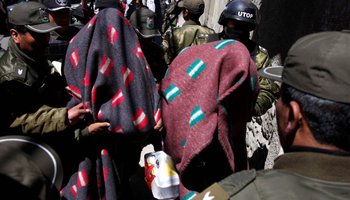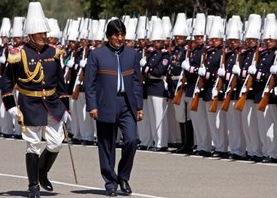Assassination plot strikes a raw nerve
April 21, 2009 - The Washington Times
Martin Arostegui
 SANTA CRUZ, Bolivia | Mercenaries accused of plotting to assassinate President Evo Morales were recruited through extreme right-wing groups in Eastern Europe financed by wealthy opponents of Mr. Morales, Bolivian government officials say.
SANTA CRUZ, Bolivia | Mercenaries accused of plotting to assassinate President Evo Morales were recruited through extreme right-wing groups in Eastern Europe financed by wealthy opponents of Mr. Morales, Bolivian government officials say.
"We are looking for the intellectual authors, the financiers of this," said Vice President Alvaro Garcia Linera, after police fatally shot three members of a suspected terrorist team and arrested two others in a night raid on a Santa Cruz hotel Thursday.
Local press reports say two to four more people have been arrested since then.
The groups leader, who was fatally shot while in his room, has been identified as Eduardo Rosza Flores, a Bolivian Hungarian dual national who fought for Croatia during the Balkan wars of the 1990s.
Mr. Flores led an "international brigade" composed of members of several other nationalities, investigators said, and he boasted of his mercenary exploits in the Balkans on a personal Web site.
Mr. Garcia said that Mr. Rosza was photographed at several parties and barbecues with conservative politicians and businessmen in Santa Cruz, where a European-descent elite forms the core of opposition against Mr. Morales efforts to establish a socialist state dominated by Bolivia's majority Indian population.
 "They know who they are," said Mr. Garcia, who stopped short of mentioning names but said they will be publicly charged in the coming days.
"They know who they are," said Mr. Garcia, who stopped short of mentioning names but said they will be publicly charged in the coming days.
Other government officials and commentators on state-operated television and radio have openly blamed wealthy landowners and former Santa Cruz Civic Committee leader Branco Marincovic for backing the purported plot.
Sen. Ricardo Diaz of Mr. Morales ruling party, the Movement Toward Socialism (MAS), has said that a Croatian neo-Nazi movement called Ustasha, had "gained influence over the Civic Committee and other key Santa Cruz institutions" through Mr. Marincovic.
Ustasha was the name used during the World War II era by pro-Nazi Croats, who ruled parts of Yugoslavia then occupied by Nazi Germany and Italy.
Mr. Marincovic is the son of a Croatian businessman who emigrated to Bolivia to escape from Yugoslavia's communist regime established after Hitlers 1945 defeat. He went on to establish a lucrative cooking oil business in Santa Cruz.
The Croatian community is highly influential in eastern Bolivia, holding key positions in local business cooperatives and owning one of the largest local TV stations.
A lawyer for Mr. Marincovic, who until last month was president of the politically powerful Santa Cruz Civic Committee, denied that he had any connection with Mr. Rosza or the purported assassination attempt. Mr. Marincovic, who is in Miami, could not be reached for comment.
Local officials also reject the charges against Mr. Marincovic.
"This is all a vulgar show staged by the government" said Santa Cruz Gov. Ruben Costas.
Mr. Morales' MAS party has targeted Mr. Marincovic in the past. Last year, it circulated documents purporting to show that he worked with the U.S. State Department in an unsuccessful campaign to oust Mr. Morales in an August referendum.
MAS documents also sought to link Mr. Marincovic to U.S. Ambassador Philip Goldberg, and to link both to post-referendum violence that resulted in the deaths of 17 people.
Mr. Morales expelled Mr. Goldberg, accusing him of instigating a rebellion. The U.S. angrily denied the charge, expelled the Bolivian ambassador to Washington and froze dozens of bilateral development programs.
Mr. Marincovic, a Croat and Bolivian national, does not give telephone interviews, an aide told The Washington Times late last year.
But the Santa Cruz Civic Committee's vice president, Luis Nunez, told The Times that the MAS claims were lies. "They say anything they want and never offer proof."
"With all due respect, we have never received any money or other kinds of support from the United States," Mr. Nunez said.
Mr. Costas, the governor of Santa Cruz province, this week called the latest campaign against Mr. Marincovic an attempt by Mr. Morales to create a pretext to round up activists who oppose his plans to nationalize much of Bolivia's economy.
Mr. Morales is Bolivia's first Indian president. His 2005 election reflected a national divide between the poorer indigenous population in the western highlands and the mestizo and European-descent residents of the more prosperous eastern lowlands.
Until Mr. Morales' election, Easterners had dominated Bolivian politics.
Mario Cronnenbold, a member of the national assembly from Santa Cruz, said a cache of weapons linked to the purported assassination plot were "planted" by government agents.
Mr. Morales called on President Obama to condemn the assassination plot while he attended a weekend summit of hemispheric leaders in Trinidad.
"If he remains silent, I would have to assume that a conspiracy was hatched before the U.S. Embassy," Mr. Morales told reporters at the summit.
Mr. Obama, commenting on the purported assassination plot, said Sunday his administration "absolutely opposed" the violent overthrow of any democratically elected government.
Police officials have said that Mr. Rosza and his group, which included another Hungarian, a Romanian, a Bolivian and an Irish national participated in last years violence.
Government investigators said that the group had been under surveillance for some months and it had been observed monitoring Mr. Morales at several public events to study his personal security.
Mr. Rosza and the Irish national gave paramilitary instruction to members of the Santa Cruz Youth Union militia at a shooting range in the Santa Cruz suburb of Warnes, according to police investigators.
Journalists who knew Rosza in Budapest say that he has circulated an e-mail to his extensive mailing list in Hungary, Romania, Croatia and several other East European countries asking for volunteers to fight for a separate nation in eastern Bolivia.
A Budapest magazine editor, Zalta Brady, who spoke with Mr. Rosza two days before his death, said there was no assassination plot against Mr. Morales and that his mission was geared toward forming "guerrillas in the jungle."
• Kelly Hearn contributed to this report.